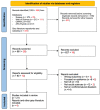The Integration of Social Science for Community Engagement in the Humanitarian Fields of Conflicts and Disasters: A Scoping Review
- PMID: 37835126
- PMCID: PMC10573063
- DOI: 10.3390/ijerph20196856
The Integration of Social Science for Community Engagement in the Humanitarian Fields of Conflicts and Disasters: A Scoping Review
Abstract
Community engagement (CE) is essential to humanitarian assistance, and the social sciences have been credited in recent epidemics and disease outbreaks as having played a crucial, supportive role. Broadening this attention to other humanitarian fields, this scoping review asks what lessons learned can be found in grey and peer-reviewed literature on the integration of the social sciences in CE for conflicts and disasters. Using an analytical framework developed through a UNICEF-led project called Social Science for Community Engagement (SS4CE) in Humanitarian Action, we identified 1093 peer reviewed publications and 315 grey literature reports of possible relevance. The results show that only a small minority-18 publications and 4 reports-tangibly comment on the relevance of social sciences, mostly only in passing and implicitly. While social science techniques are used and the importance of understanding a community's cultural, linguistic, and religious context is emphasized, further discussion on the integration of transdisciplinary and multidisciplinary social sciences is absent. Furthermore, CE is mostly seen as an instrumental ('means to an end') involvement, for example to collect data in emergency situations and receive feedback on interventions, but not as a critical and transformative intervention. We conclude that unlike the attention given to social sciences in disease outbreaks, there is a knowledge gap and an accordingly proper planning and implementation gap regarding the potentiality of social science to improve CE across all humanitarian contexts of disasters and conflicts.
Keywords: community engagement; conflict; disasters; hazards; humanitarian action; social sciences.
Conflict of interest statement
The authors declare no conflict of interest. The funder had no role in the design of the study; in the collection, analyses, or interpretation of data; in the writing of the manuscript; or in the decision to publish the results.
Figures
References
-
- United Nations Office for the Coordination of Humanitarian Affairs (OCHA) Global Humanitarian Overview 2022. United Nations Office for the Coordination of Humanitarian Affairs (OCHA); Geneva, Switzerland: 2022. Introduction.
-
- UNICEF . Minimum Quality Standards and Indicators for Community Engagement. UNICEF; New York, NY, USA: 2020.
-
- Bardosh K.L., de Vries D.H., Abramowitz S., Thorlie A., Cremers L., Kinsman J., Stellmach D. Integrating the Social Sciences in Epidemic Preparedness and Response: A Strategic Framework to Strengthen Capacities and Improve Global Health Security. Glob. Health. 2020;16:120. doi: 10.1186/s12992-020-00652-6. - DOI - PMC - PubMed
-
- European Centre for Disease Prevention and Control (ECDC) Guidance on community engagement for public health events caused by communicable disease threats in the EU/EEA. European Centre for Disease Prevention and Control (ECDC); Stockholm, Sweden: 2020.
Publication types
MeSH terms
LinkOut - more resources
Full Text Sources
Medical
Miscellaneous


